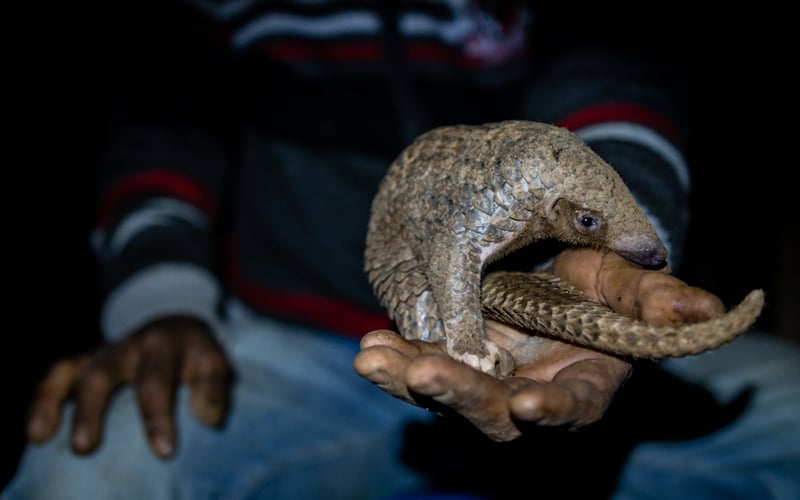
Pangolins are the world’s most traded mammals. Native to 51 countries globally, more than one million are estimated to have been traded between 2000 and 2013. There are eight species of pangolin, four in Asia and four in Africa.
Between 2017 and 2019 alone, 77 tonnes of pangolins scales were seized originating from Nigeria. This represents close to 214, 000 pangolins.
This massive trade is fuelled by the demand for meat and traditional medicine especially across Asian countries. An investigation by the wildlife trade – related Non – Governmental Organisation Wild Aid found that 70% of Chinese citizen believe that Pangolin products have medicinal value.
Learn more on the connection between wildlife trade and coronavirus
Pangolin scales as medicine
The rise in search for cheap medicine has contributed to the creation of alternatives that have overtime gained massive popularity. Combined with extensive traditional and digital media coverage, more acceptance of unscientifically proven medicine has sprung up.
Traditional medicine from wildlife is majorly believed to treat impotence and fertility. Among other communities it is believed to boost blood circulation, stimulating lactation in nursing mothers, treating skin disorders and wound infections. Sadly, these curative claims are not backed by any scientific proof. Pangolin scales are just composed primarily of keratin, the substance that is up fingernails and hair!
But is there light at the end of the tunnel for pangolins?
On 20th August 2019, the China National Medical Insurance and the Human Resource and Social Security Bureau announced that medicines containing pangolin scales and derivatives will no longer be covered under the Chinese national insurance.
The announcement also removed hawksbill sea turtle, sea horse, coral, and saiga antelope antlers, among other wildlife-derived products, from the list of drugs eligible for reimbursement by government-funded insurance. And with the pangolin now regarded as a key suspect in the transmission of Coronavirus, we hope to see China government taking more stringent steps to completely outlaw trade in pangolins and other wild animals for meat and traditional medicine?
Cruelty behind Pangolin trade
Our report ‘Suffering at scale – pangolin poaching for the traditional medicine trade,’ reveals how pangolins endure unimaginable suffering. They are smoked, dragged out of trees and burrows, bludgeoned with clubs and machetes. They are then boiled, sometimes alive for their scales. The process of digging them out from their environment can take hours causing extreme stress and torture to the animal.
Their carcasses, scales and body parts are then sold to middlemen who ensure illegal distribution to other countries and the cycle of terror continues.
Endangered Species
Pangolins are protected by the Convention on International Trade in Endangered Species of Wild Fauna and Flora (CITES). They are listed on CITES Appendix I, meaning international commercial trade in them is forbidden. Despite this level of protection, illegal trade in them is still flourishing facilitated by weak enforcement in source countries.
Experts are concerned that poaching coupled with the low reproduction of Pangolins are pushing them to the brink of extinction. The illegal trade of Pangolins is now recognised as the biggest contributor to their demise.
Our ask
To combat the global wildlife trade, This World Pangolin Day, we are asking for;
- Strong enforcement of national and international laws to protect them.
- Removal of pangolins from the definitive traditional medicine handbook for everyone working in the industry.
- Investment in and promotion of herbal and synthetic medicine.
- Combined and coordinated efforts by Governments, NGOs and the traditional Asian Medicine practitioners particularly in China and Vietnam.
- Support for alternative livelihoods and education within communities where Pangolins exist.
Our efforts
We move the world to protect animals through campaign and working closely with governments and industries.
In 2019, we participated in the Convention of International Trade of Endangered Species (CITES). We ensured Asian otter, the Indian star tortoise and several other reptile and amphibian species are given further protection by being added to CITES Appendix I.
Under Appendix I, species receive the highest level of international trade regulation possible, which effectively rules out international trade for commercial purposes. The success of these up-listings is a key defining moment for global wildlife.
We intend to continue pushing for further protection of global wildlife so that they remain in the wild where they can interact with their own and exude natural behaviour.
Join our global movement
We believe wild animals belong in the wild. They are wildlife, not pets or entertainers.
If you agree, sign up to our newsletter below and keep up to date with our vital work protecting animals.
Between 2017 and 2019 alone, 77 tonnes of pangolins scales were seized originating from Nigeria. This represents close to 214, 000 pangolins.